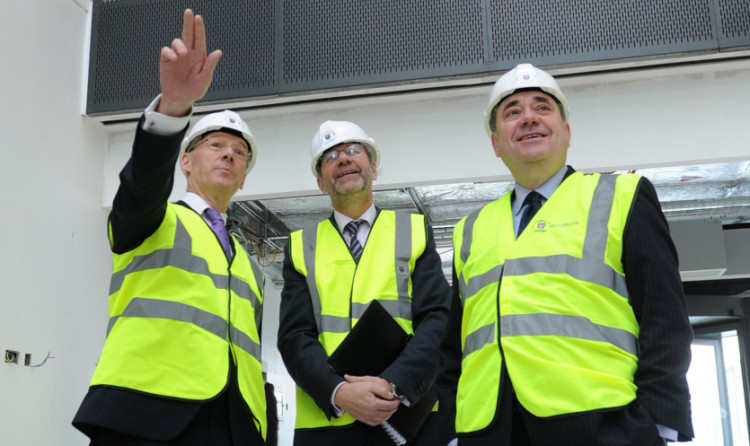Alex Salmond centred on reindustrialising Scotland, doubling exports and encouraging more immigration as he outlined his vision for economic independence.
Speaking as he launched a Scottish Government analysis paper to invited guests at Dundee University alongside Finance Secretary John Swinney, the First Minister also focused on getting more women into work and supporting business growth through tax cuts.
However, Alistair Darling, former Labour chancellor and leader of pro-Union campaign group Better Together, branded the plans “fantasy economics”.
In turn the First Minister rejected findings by the Institute of Fiscal Studies, which claimed an independent Scotland would need to raise taxes, cut spending or both to create a sustainable economy over the next 50 years.
“The one-size-fits-all economic policies of successive Westminster Governments have failed and are continuing to fail the people of Scotland,” Mr Salmond said.
“We perform well at the moment but we should be doing so much better. A simple glance at many other European countries of similar size to Scotland, some without the natural advantages Scotland has, shows that we have lagged behind their growth rates for decades.
“Independence will give us the chance to build an economy that takes advantage of Scotland’s unique strengths and size to deliver a more outward-focused, fairer and resilient economy, boosting revenues and creating many thousands more jobs.”
The 201-page document, Economic Policy Choices in an Independent Scotland, did contain the warning: “There will be challenges, not least in restoring the public finances to health and unravelling decades of under-investment in the economy. “Competing priorities will require to be managed.”
It admitted there would be no “overnight solutions” to economic challenges.
However, it also pointed to arguments suggesting there could be a “psychological ‘independence’ stimulus” which would boost business growth.
It added: “For example, a number of economists believe that independence could strengthen Scotland’s national economic self-confidence.”
The report also suggests that Scottish funding through the Barnett Formula could be slashed by £4 billion if the country votes no next September.
On population, the First Minister noted an increase in projected figures but said: “We should be trying to be rather better than that.
“We should be aiming much more ambitiously in terms of bringing our population, our working population levels, not just to the European average but significantly beyond it.”
Mr Salmond focused on cutting corporation tax as one way of boosting growth and argued that productivity could also be increased by expanding exports.
If the country were independent “next week”, he said Scotland would be eighth most prosperous in the world for gross domestic product and have an income £2,000 a head higher than the UK average.
Mr Darling said: “Their paper seems to be telling people that the best way to respond to the warning from experts that going it alone would mean tax rises for families and service cuts to communities is to make unfunded promises of business tax cuts. It just doesn’t make any sense.
“It wouldn’t solve the problem if anything, it would make it worse.”
